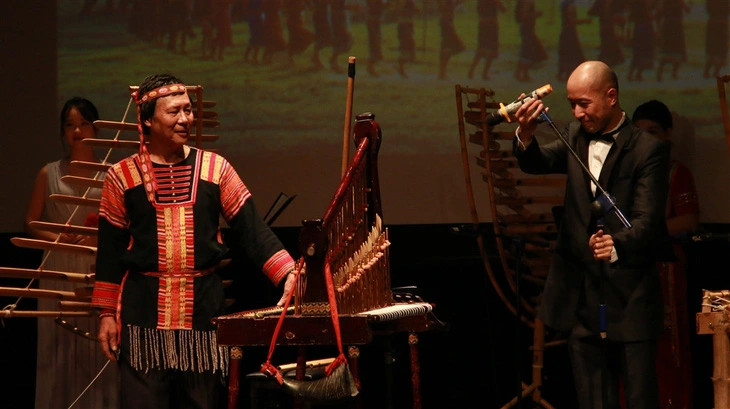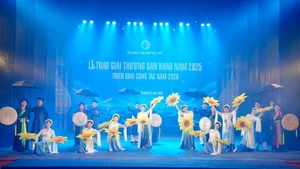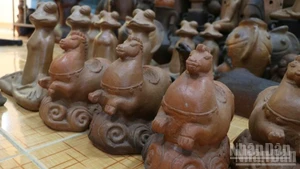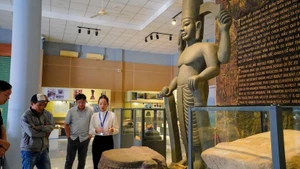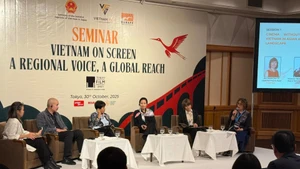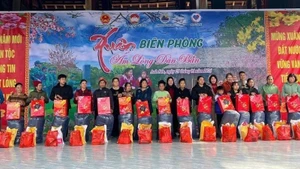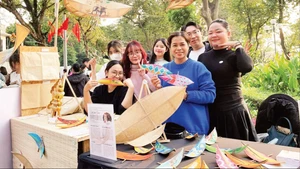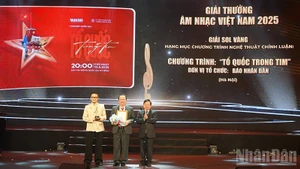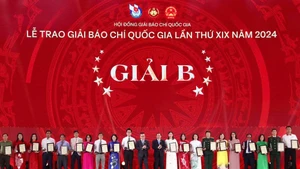Born in Phu Xuyen District, Hanoi, in 1952, Minh has been nurturing the love for folk singing melodies and musical instruments since his childhood. At the age of 17, he participated in the entrance exam to the Vietnam School of Music (now the Vietnam National Academy of Music), and then became a violin student in the string faculty.
While studying here, he met and fell in love with a girl who studied zither and they were then married. His wife is Meritorious Artist Mai Lai, former Head of the zither subject under the Faculty of Traditional Musical Instruments at the Vietnam National Academy of Music.
Thanks to the knowledge gained from more than 10 years of studying and playing Western musical instruments, Dong Van Minh understood the operating principles and knew how to play nearly 10 different types of traditional musical instruments, such as flutes, t’rung (bamboo xylophone), stone instruments, and indigenous instruments of the Central Highlanders.
The more he discovered traditional melodies, the more passionate and interested he found in it.
After graduating from the academy in 1979, he worked at the Vietnam Music and Dance Theatre, an established arts unit operating in traditional music in Vietnam.
While working as a cellist and a bass quartet performer in the theatre, Minh carried out deeper research on traditional musical instruments.
He realising that some types of musical instruments had limitations in timbre and expression, he worked to find a way to improve them.
For example, the original ‘dinh pa’ bamboo instrument of the Central Highlanders only used a pentatonic scale; and Minh developed it into 12 notes, allowing players to play more musical styles.
Minh also renovates the ‘chinh gram’ instrument, which was made entirely of bamboo sticks, by installing a resonator to make the sound more resonant, fuller, and rounder.
The traditional musical instruments retouched by Minh have been brought to the stage at many programmes hosted by the Vietnam Music and Dance Theatre, leaving deep impressions on audiences.
In particular, in 1988, artist Dong Van Minh invented a completely new musical instrument called the ‘bamboo piano’.
The instrument is designed with 12 pitches, so it is capable of performing many different pieces of music, both Vietnamese and international. It can express a variety of tones depending on the level of collision between large and small bamboo pipes, following the vibration of the finger pressing the pipes.
Thanks to this invention, in November 1988, artist Dong Van Minh’s performance at the National Festival of Traditional Musical Instruments won a perfect 50-out-of-50 score from the five-member jury, thus helping him bag the first gold medal in his arts career.
This is also a milestone marking his transformation from a group performer to a solo artist. He became one of the leading craftsmen of bamboo and stone instruments in Vietnam.
Over the past three decades, he has crafted thousands of high-quality traditional musical instruments for artists, art troupes, and professional art schools throughout the country.
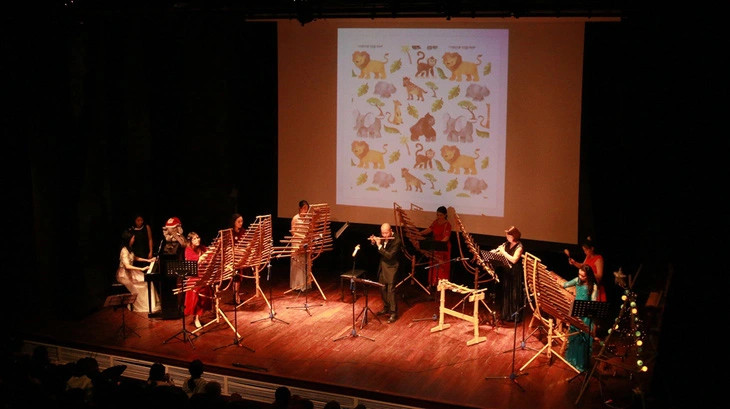 |
| At a concert hoste by Suc Song Moi orchestra in 2019 (Photo: tuoitre.vn) |
Artist Dong Van Minh shared that he is always proud and happy because the love of traditional music has been passed down to both his sons, Dong Quang Vinh and Dong Minh Anh.
The elder son, Dong Quang Vinh, has studied bamboo flute at the Vietnam National Academy of Music since the age of nine, while his younger brother Dong Minh Anh studied monochord.
Realising that his two children’s talent in music, Dong Van Minh came up with the idea of forming a family band that only play traditional music with bamboo instruments that he made by himself.
As a result, in 1993, the band Tre Viet (Vietnamese Bamboo) was established, and quickly becoming a “cultural ambassador” promoting Vietnamese music to the world as it was invited to perform in many countries.
The band’s first abroad tour was in Japan in 1996. That was the time when Japanese youth were fascinated by new music trends and turned their back away from traditional music.
However, when they saw 12-year-old boy Dong Quang Vinh confidently performing many Vietnamese folk songs, with many different musical instruments, the Japanese audience was truly moved and touched by the folklore melodies.
Inspired by his father’s Tre Viet band, after completing his master degree in China and returning home, conductor Dong Quang Vinh established the Suc Song Moi (New Vitality) orchestra, which uses bamboo musical instruments to deliver academic music in an impressive and creative way.
Dong Van Minh has won numerous certificates of merit, gold medals, and prizes at festivals, professional competitions, and cultural exchange programmes both at home and abroad.
As a result of his valuable contributions for the preservation of national culture, Minh was awarded the title of Meritorious Artist in 1997 and received the Prime Minister’s certificate of merit in 2012.
Most recently, he was honoured with the title of People's Artist. At the age of 72, after more than 10 years of retirement, artist Dong Van Minh remains dedicated to safeguarding and promoting traditional music.
